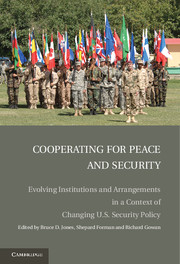 Cooperating for Peace and Security
Cooperating for Peace and Security Book contents
- Frontmatter
- Contents
- Contributors
- Foreword
- Acknowledgments
- I FRAMEWORK
- II ADAPTING COLD WAR INSTITUTIONS
- 4 An Evolving UN Security Council
- 5 Too Many Institutions? European Security Cooperation after the Cold War
- 6 Whither NATO
- 7 The Evolution of Nuclear Nonproliferation Institutions
- 8 9/11, the War on Terror, and the Evolution of Multilateral Institutions
- 9 Evolution and Innovation: Biological and Chemical Weapons
- III NEW TOOLS, NEW MECHANISMS
- IV CONCLUSIONS
- Index
- References
4 - An Evolving UN Security Council
Published online by Cambridge University Press: 22 January 2010
- Frontmatter
- Contents
- Contributors
- Foreword
- Acknowledgments
- I FRAMEWORK
- II ADAPTING COLD WAR INSTITUTIONS
- 4 An Evolving UN Security Council
- 5 Too Many Institutions? European Security Cooperation after the Cold War
- 6 Whither NATO
- 7 The Evolution of Nuclear Nonproliferation Institutions
- 8 9/11, the War on Terror, and the Evolution of Multilateral Institutions
- 9 Evolution and Innovation: Biological and Chemical Weapons
- III NEW TOOLS, NEW MECHANISMS
- IV CONCLUSIONS
- Index
- References
Summary
The chapter argues that the Security Council's decisions over the past twenty years, largely improvised and inconsistent though they may be, have, for good or ill, eroded the foundations of absolute conceptions of state sovereignty, allocating to the Council itself powers that fundamentally alter the way in which relationships among international organizations, states, and citizens are likely to be ordered in decades ahead.
INTRODUCTION – THE P5 IN FIRM CONTROL
One important signal of the thaw in the Cold War was a noticeable improvement in the climate among the Permanent Five (P5) members of the United Nations Security Council (UNSC). The first serious evidence of the relaxation in East–West tensions within the Council was their ability, at the invitation of UN Secretary-General Javier Perez de Cuellar, in 1987, to tackle resolution of the murderous Iran–Iraq war. The war came to an end in mid-1988 on the terms laid out in Security Council Resolution (SCR) 598. The post–Cold War era at the UN had started.
The ability and disposition of the five permanent members, those holding veto power, to cooperate with one another seriously diminished the margin for maneuver of other Council members. Now nonpermanent members grumbled that they were systematically marginalized, a complaint lent more weight by a tendency of the Secretariat to consult privately with some or all of the P5 before advancing recommendations to the Council as a whole.
Information
- Type
- Chapter
- Information
- Cooperating for Peace and SecurityEvolving Institutions and Arrangements in a Context of Changing U.S. Security Policy, pp. 59 - 79Publisher: Cambridge University PressPrint publication year: 2009
References
Accessibility standard: Unknown
Why this information is here
This section outlines the accessibility features of this content - including support for screen readers, full keyboard navigation and high-contrast display options. This may not be relevant for you.Accessibility Information
- 1
- Cited by